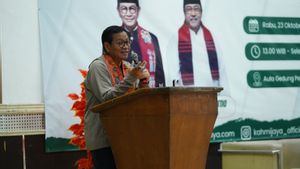JAKARTA - The Health Bill, which is made in the Omnibus Law method, is still reaping the pros and cons. Although there was a rejection, this bill also gains a lot of support from the medical community because it is considered needed in the national health system.
"We really need a law (UU) that represents our national health system because so far the existing regulatory system is partially fragmented and sometimes not harmonious between one policy and another," said Health Policy Observer, Dr. Hermawan Saputra, Thursday 8 June.
According to Hermawan, there are many regulations equivalent to the Health Bill that cannot represent and guarantee health services or efforts to protect the health of the Indonesian people. He gave an example, Law Number 44 of 2009 concerning hospitals and Law Number 36 of 2009 concerning Health, where the health system itself is regulated at the level of Presidential Regulation (Perpres).
"It's different from the national education system (Sidiknas) which is the law that regulates it. So there are separate fragments in our current health system. We have just seen this from the macro situation," explained the General Chair of the Elected PP Association of Indonesian Public Health Experts (IAKMI).
With the Omnibus Law method, the Health Bill will simplify regulations in the context of harmonizing laws and regulations regarding the health system in Indonesia. The use of the Omnibus Law method as an effort to harmonize laws and regulations is also able to suppress sectoral egos which sometimes cause opposition between one statutory regulation and another statutory regulation.
Not only that, the Omnibus Law which was formed using a modified method is also considered to make laws and regulations adapt to real conditions in society.
Hermawan assessed that the omnibus law in the Health Bill can be a comprehensive rigid rule for regulating the national health system. Including in terms of medical practice, nursing, guidance, and the practice of other medical personnel whose current rules stand alone.
"So it needs to be harmonized and synchronized. Not to mention if we relate it again to older laws, namely about drugs. The rules exist from 1949. There is also Law No. 4 of 1984 concerning epidemics, it has been a long time and we should adjust it to the current context, "said Hermawan.
The Public Health Expert also highlighted the 14-year-old hospital law. Hermawan said that the current developments must be adjusted to the latest legal umbrella due to the health transformation and also the impact of the Covid-19 Pandemic so that there must be policies that can be a guideline for when the country faces a pandemic.
"As well as a study of the health resilience system there should be, a kind of policy transition. That means there is an adjustment to the level of the law concerning the mandate of our constitution in the state, especially Article 28H paragraph (1) and Article 34 paragraph (3) in the 1945 Constitution," said the Epidemiologist.
Hermawan's intention regarding Article 28H paragraph (1) of the 1945 Constitution is: Everyone has the right to live an inner and prosperous life, live, and get a good and healthy environment and is entitled to health services. While Article 34 paragraph (3) is: The state is responsible for the provision of health service facilities and proper public service facilities.
"Of course we can discuss a lot in terms of point-by-point derivatives of interests related to health matters, which we must synchronize all of them," said Hermawan.
Furthermore, the Lecturer of the Postgraduate Study Program for Public Health Sciences Uhamka Jakarta said, there is one crucial issue that has been minimally regulated in regulations and has not become the main flow, namely regarding public health. Therefore, Hermawan assessed that the Health Bill was very much needed because it regulated this.
"People's health is in various issues. Starting from the financing issue currently being organized by BPJS. Of course, if we talk about the National Health Insurance system, it's not just treatment at health facilities (health facilities)," he said.
But also how to maintain health, increase the productivity of healthy people and prevent disease. Including promotion and education efforts, all of these are parts that must be guaranteed through the National Health program," added Hermawan.
The Health Bill is also said to accommodate efforts to recognize various professional clumps in various fields of public health. Hermawan said the most important thing related to this issue was how health workers should be at the forefront when a public health emergency occurs due to the Covid pandemic.
"So we are looking for epidemiologists, health investigators, surveillance personnel, when the Covid-19 pandemic occurs, it is very difficult to find," he said.
Not to mention being combined with health promoters, then how is the aspect of environmental health expertise included the narrative for health and communication policies. All of that must be covered by a regulation, "added Hermawan.
The law related to existing health matters is considered not to have a public health approach as is needed when a pandemic occurs. Hermawan invites the public to see how stuttering the State was when Indonesia first faced the Covid-19 pandemic because the system and rules were not yet capable.
"As far as we can see, in the previous law, this is not considered. Even in the realm of professions it should be fought for," said the health practitioner who graduated from the University of Indonesia.
As is known, there are a number of health workers professional organizations (OP) who reject the Health Bill to carry out demonstrations, and even threaten a strike. The health practitioners who reject the Omnibus Law Bill include the Indonesian Doctors Association (IDI), the Indonesian National Nurses Association (PPNI), the Indonesian Midwives Association (IBI), the Indonesian Pharmacist Association (IAI), and the Indonesian Dental Doctors Association (PDGI).
The rejection of the Health Bill by a number of OPs was caused by several things. Health workers who reject the bill think that criminalization will occur if the Health Bill is ratified because there is a disappearance of lex specialis elements in the professional law where this bill, if passed, will revoke the law (UU) on doctors, the law on dentists, the Law on nurses, the Law on midwives, the Law on health workers, and the Law on hospitals.
In the Health Bill, OP's authority is also no longer single. The lost OP authority is related to the provision of recommendations to obtain a practice permit. There is also a conflict regarding articles related to tobacco and alcohol.
Regarding this rejection, Hermawan assessed that there is still room for discussion between the DPR and the Government as the legislators, along with relevant stakeholders, including a number of OPs that reject the Health Bill.
"This pros and cons of the Health Bill must be bridged with good and adequate communication so that we understand why the philosophical and social aspects have an impact on the juridical aspect for the study of the development of the health system in Indonesia now and in the future," concluded Hermawan.
The English, Chinese, Japanese, Arabic, and French versions are automatically generated by the AI. So there may still be inaccuracies in translating, please always see Indonesian as our main language. (system supported by DigitalSiber.id)









